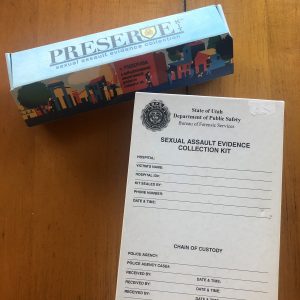Update: this bill was approved by the House Law Enforcement and Criminal Justice Committee on Friday, January 21st.
(KCPW News) In the hours after an attack, victims of sexual assault can feel exceptionally vulnerable and protective of their privacy. As a result, someone who experienced an assault can often find it difficult to go to an emergency room where forensic nurses collect evidence that could be used in a criminal investigation and ultimately a court of law.
In 2019, two companies began selling “at home” kits that claimed to give sexual assault victims the ability to collect evidence themselves in the privacy of their own homes.
The companies selling the PRESERVE Kit and the MeToo Kit touted their products as an alternative to an emergency room visit, and as a more private method to collect and preserve DNA and other evidence from an assault.
But Dr. Julie Valentine, a forensic nurse and associate dean at Brigham Young University’s College of Nursing says that the kits present a false hope to victims and that their sale should be prohibited.
“Immediately, significant concerns came up with victim advocacy and health care professionals, and with attorneys general throughout the country regarding the legal admissibility of these kits,” Valentine says.
Indeed, legal experts say that without a documented chain of custody, it’s unlikely that evidence gathered would serve any purpose whatsoever in a court of law.
Salt Lake County District Attorney Sim Gill says he “strongly objects” to the sale of the products.
“These kits may actually preclude us from using evidence that we would otherwise be able to use because of questions about chain of custody and evidence spoilage,” Gill said. “They are an exploitation of people at their most vulnerable.”

In her campaign to ban the kits, Dr. Valentine has found ally in Democratic Rep. Angela Romero, who has a track-record passing legislation to aid victims of sexual assault. In 2017, Romero ran a successful measure requiring the state of Utah to process its backlog of untested rape kits, leading to the identification of more than 1,000 suspects.
Romero’s House Bill 168, up for consideration at the 2021 Utah legislative session, would simply prohibit at home evidence kits from being sold in Utah.
“We need people to go to the hospital to get examined by a sane nurse so that evidence isn’t tampered with,” Romero told KCPW.
Both the PRESERVE Kit and the MeToo Kit appear to now be off the market, but BYU’s Dr. Valentine said that similar products have appeared over the past year, claiming to be a “pandemic fix” for evidence collection after a rape or sexual assault – at a time when many hospitals are overwhelmed.
But Valentine says anyone who has been assaulted should still consider visiting any emergency room or contacting crisis hotlines, and forensic nurses can often come to a patient “where they are most comfortable.”
Both the exam and evidence collection are free of charge because of the Violence Against Women Act.
“In our state, a person can have an examination anywhere up to 7 days after the assault to collect forensic evidence,” Valentine said.
She says that forensic nurses are careful to give patients full say over their own examinations.
“We really try to restore an individual’s control, which is taken away during a rape,” she said.
If you or someone you know has experienced sexual violence, help is available by calling the Utah Rape and Sexual Assault Crisis Line at 1-888-421-1100 or the Domestic Violence Link Line at 1-800-897-LINK (5465).
How do you feel about this topic?
Is there anything else you think we should know? We'd like to hear your thoughts. Send us your feedback using the form below.




